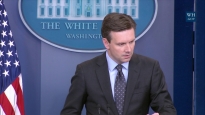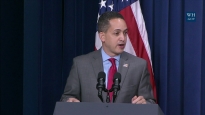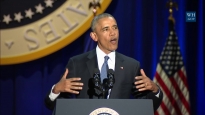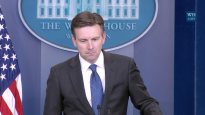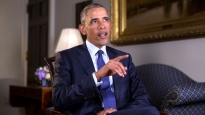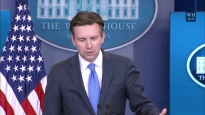President Obama Honors the Country's Top Innovators and Scientists of 2011
February 01, 2013 | 30:16 | Public Domain
The President recognizes the 2011 National Medal of Science and National Medal of Technology and Innovation recipients.
Remarks by the President at Ceremony for the 2011 National Medals of Science, and National Medals of Technology and Innovation
East Room
2:22 P.M. EST
THE PRESIDENT: Thank you. (Applause.) Thank you so much. Please, everyone have a seat. Well, it is my incredible pleasure and honor to welcome this incredibly talented group of men and women in the White House. And I want to congratulate them on earning America’s highest honor for invention and discovery -- the National Medals of Science, and the National Medals of Technology and Innovation.
Before we start, I want to acknowledge the head of the National Science Foundation, Dr. Subra Suresh, as well as the members of my Cabinet who are with us here today. Where is everybody? Where did Subra go? (Laughter.) There you go. All right, I just wanted to make sure they all showed up. (Applause.)
I especially want to thank Secretary Steven Chu, who announced this morning that he will be leaving the Department of Energy. That will be a loss for us. Steve has been a great friend, a tremendous colleague over the past four years, working on a whole range of energy issues, but also designing a cap to plug a hole in the middle of the Gulf of Mexico when nobody else could figure it out. And that’s typical of the incredible contributions that he’s made to this country. Because of his leadership, this country is further along on the path to energy independence. It’s better positioned for the jobs and industries of the future.
So, Steve, you have earned more than your fair share of relaxation time, but we are grateful for your extraordinary service. So thank you. (Applause.)
Now, this is the most collection of brainpower we’ve had under this roof in a long time -- (laughter) -- maybe since the last time we gave out these medals. I have no way to prove that, and I know this crowd likes proof. (Laughter.) But I can’t imagine too many people competing with those who we honor here today.
If there is one idea that sets this country apart, one idea that makes us different from every other nation on Earth, it’s that here in America, success does not depend on where you were born or what your last name is. Success depends on the ideas that you can dream up, the possibilities that you envision, and the hard work, the blood, sweat and tears you’re willing to put in to make them real.
We don’t always recognize the genius behind these ideas right away. The New York Times once described Robert Goddard’s belief that rockets could one day go to the moon as “[lacking] the knowledge ladled out daily in high schools.” (Laughter.) One engineer called Einstein’s brand-new theory of relativity “voodoo nonsense.” But with enough time, we usually come around. And we don’t give folks the same treatment that Galileo got when he came up with new ideas. (Laughter.) And today, it’s clearer than ever that our future as a nation depends on keeping that spirit of curiosity and innovation alive in our time.
So these honorees are at the forefront of that mission. Thanks to the sacrifices they’ve made, the chances they’ve taken, the gallons of coffee they’ve consumed -- (laughter) -- we now have batteries that power everything from cell phones to electric cars. We have a map of the human genome and new ways to produce renewable energy. We’re learning to grow organs in the lab and better understand what’s happening in our deepest oceans. And if that’s not enough, the people on this stage are also going to be responsible for devising a formula to tame frizzy hair -- (laughter) -- as well as inspiring the game Tetris.
But what also makes these individuals unique is how they’ve gotten here -- the obstacles they’ve overcome and the commitments they’ve made to push the boundaries of our understanding.
Jim Gates’s father, for example, was in the Army, and by the time Jim was in 6th grade, he had attended six different schools. But he still remembers the day he came home and saw his father standing on the porch with a big smile on his face. And that’s how Jim knew he had gotten into MIT -- on his way to becoming one of our foremost experts in supersymmetry and string theory.
When Gholam Peyman first accepted a position at the University of Illinois, his office was a converted restroom. (Laughter.) But he carved out enough space for himself, his secretary and his lab equipment. And today he’s known as the father of LASIK eye surgery.
Sandra Moore Faber had a passion for astronomy from the very beginning. But when she visited one of our nation’s top observatories as a grad student, they didn’t have a dorm for female astronomers, so Sandra ended up sleeping on the sofa in the caretaker’s cottage. Now, luckily, that didn’t slow her down, and she became one of the world’s foremost experts in the evolution of the universe.
In a global economy where the best jobs follow talent -- whether in Calcutta or Cleveland -- we need to do everything we can to encourage that same kind of passion, make it easier for more young people to blaze a new trail.
Right now, only about a third of undergraduate students are graduating with degrees in science, technology, engineering and math -- areas that will be crucial if we expect to complete the work that has been done by these folks and compete for the jobs of the future. And that’s why we’ve worked to make more affordable college opportunities, and set a goal of training 100,000 new math and science teachers over the next decade. And we’re working to train 2 million Americans at our community colleges with the skills businesses are looking for right now.
We also need to do something about all the students who come here from around the world to study but we then send home once they graduate. On Tuesday, I was in Las Vegas talking about the need for comprehensive immigration reform. And one important piece of that reform is allowing more of the best and brightest minds from around the world to start businesses, initiate new discoveries, create jobs here in the United States of America. If we want to grow our economy and strengthen the middle class, we need an immigration system built for the 21st century. It’s that simple.
One of the scientists being honored today is Jan Vilcek. Jan was born in Slovakia to Jewish parents who fled the Nazis during World War II. To keep their young son safe, his parents placed him in an orphanage run by Catholic nuns. And later, he and his mother were taken in by some brave farmers in a remote Slovak village and hidden until the war was over. And today, Jan is a pioneer in the study of the immune system and the treatment of inflammatory diseases like arthritis.
People like Jan obviously had enormous talent. In some fundamental ways, they were destined to be on this stage. The minds they were born with, the drive they innately possess, the positive forces that shaped their lives were more powerful than the forces aligned against them. So they beat the odds. But even with all those gifts, every one of today’s honorees also had somebody who offered them a hand -- a teacher who sparked their interest; a scholarship that paved the way -- and an opportunity to come to America and bring even the most distant dream within our reach.
And that reminds us of our obligations to each other and to this country. We can -- no matter how many talented folks there are in this country, if we’re not offering a hand up, a lot of those folks are going to miss out on what might be their destiny. We can make it easier for our young people to learn the skills of the future. We can attract the brightest minds to our shore. We can celebrate and lift up and spotlight researchers and scientists like the ones here today, so that somewhere, a boy on an Army base, or a girl looking through a telescope, or a young scientist working out of a converted bathroom can make it their goal to stand where these honorees will be standing when they receive their medals.
That’s what we can do and that’s what we must do. That’s what I intend to do as long as I’m President.
So I want to congratulate these extraordinary Americans once again for all their accomplishments. I want to wish our military aides the best of luck as they attempt to read the citations. (Laughter.) Because I can assure you they practiced hard on this all week long.
You good? You feel good? (Laughter.) All right. There are a lot of syllables in some of these things. (Laughter.) I won’t know the difference, but they will. (Laughter.)
Congratulations, everybody. (Applause.)
(The citations are read and the medals are presented.)
MILITARY AIDE: Allen J. Bard. 2011 National Medal of Science to Allen J. Bard, University of Texas, Austin. For contributions in electrochemistry, including electroluminescence, semiconductor photoelectrochemistry, electroanalytical chemistry, and the invention of the scanning electrochemical microscope. (Applause.)
Sallie W. Chisholm. 2011 National Medal of Science to Sallie W. Chisholm, Massachusetts Institute of Technology. For contributions to the discovery and understanding of the dominant photosynthetic organisms in the ocean, promotion of the field of microbial oceanography, and influence on marine policy and management. (Applause.)
Sidney D. Drell. 2011 National Medal of Science to
Sidney D. Drell, Stanford University. For contributions to quantum field theory and quantum chromodynamics, application of science to inform national policies in security and intelligence, and distinguished contributions as an advisor to the United States government. (Applause.)
Sandra M. Faber. 2011 National Medal of Science to
Sandra M. Faber, University of California, Santa Cruz. For leadership in numerous path-breaking studies of extra-galactic astronomy and galaxy formation, and for oversight of the construction of important instruments, including the Keck telescopes. (Applause.)
Sylvester James Gates, Jr. 2011 National Medal of Science to Sylvester James Gates, Jr., University of Maryland. For contributions to the mathematics of supersymmetry in particle, field, and string theories and extraordinary efforts to engage the public on the beauty and wonder of fundamental physics. (Applause.)
Solomon W. Golomb. 2011 National Medal of Science to Solomon, W. Golomb, University of Southern California. For pioneering work in shift register sequences that changed the course of communications from analog to digital, and for numerous innovations in reliable and secure space, radar, cellular, wireless, and spread-spectrum communications. (Applause.)
John B. Goodenough. 2011 National Medal of Science to
John B. Goodenough, University of Texas, Austin. For groundbreaking cathode research that led to the first commercial lithium ion battery, which has since revolutionized consumer electronics with technical applications for portable and stationary power. (Applause.)
M. Frederick Hawthorne. 2011 National Medal of Science to M. Frederick Hawthorne, University of Missouri. For highly creative pioneering research in inorganic, organometallic, and medicinal borane chemistry; sustained and profound contributions to scientific and technical advice related to national security; and for effective, prolific, and devoted service to the broad field of chemical sciences. (Applause.)
Leroy Hood. 2011 National Medal of Science to Leroy Hood, Institute for Systems Biology. For pioneering spirit, passion, vision, inventions, and leadership combined with unique cross-disciplinary approaches resulting in entrepreneurial ventures, transformative commercial products, and several new scientific disciplines that have challenged and transformed the fields of biotechnology, genomics, proteomics, personalized medicine, and science education. (Applause.)
Barry C. Mazur. 2011 National Medal of Science to
Barry C. Mazur, Harvard University. For original and landmark contributions to differential topology, number theory, and arithmetic algebraic geometry, where, among other applications, his work was fundamental to Wiles’ proof of Fermat’s Last Theorem, and for his dedication to communicating subtle mathematical ideas to the broader public. (Applause.)
Lucy Shapiro. 2011 National Medal of Science to
Lucy Shapiro, Stanford University. For the pioneering discovery that the bacterial cell is controlled by an integrated genetic circuit functioning in time and space that serves as a systems engineering paradigm underlying cell differentiation and ultimately the generation of diversity in all organisms. (Applause.)
Anne M. Treisman. 2011 National Medal of Science to
Anne M. Treisman, Princeton University. For a 50-year career of penetrating originality and depth that has led to the understanding of fundamental attentional limits in the human mind and brain. (Applause.)
Frances H. Arnold. 2011 National Medal of Technology and Innovation to Frances H. Arnold, California Institute of Technology. For pioneering research on biofuels and chemicals that could lead to the replacement of pollution-generating materials. (Applause.)
George Carruthers. 2011 National Medal of Technology and Innovation to George Carruthers, U.S. Naval Research Lab. For invention of the Far UV Electrographic Camera, which significantly improved our understanding of space and earth science. (Applause.)
Robert Langer. 2011 National Medal of Technology and Innovation to Robert Langer, Massachusetts Institute of Technology. For inventions and discoveries that led to the development of controlled drug release systems, engineered tissues, angiogenesis inhibitors, and new biomaterials. (Applause and laughter.)
Norman R. McCombs. 2011 National Medal of Technology and Innovation to Norman R. McCombs, AirSep Corporation. For the development and commercialization of pressure swing adsorption oxygen-supply systems with a wide range of medical and industrial applications that have led to improved health and substantially reduced health care costs. (Applause.)
Gholam A. Peyman. 2011 National Medal of Technology and Innovation to Gholam A. Peyman, University of Arizona College of Medicine and Arizona Retinal Specialists. For invention of the LASIK surgical technique, and for developing the field of intraocular drug administration and expanding the field of retinal surgery. (Applause.)
Arthur H. Rosenfeld. 2011 National Medal of Technology and Innovation to Arthur H. Rosenfeld, American Council for an Energy-Efficient Economy and California Institute for Energy and Environment and Lawrence Berkeley National Laboratory. For extraordinary leadership in the development of energy-efficient building technologies and related standards and policies. (Applause.)
Jan T. Vilcek. 2011 National Medal of Technology and Innovation to Jan T. Vilcek, New York University School of Medicine. For pioneering work on interferons and key contributions to the development of therapeutic monoclonal antibodies. (Applause.)
Rangaswamy Srinivasan and James Wynne. 2011 National Medal of Technology and innovation to Samuel Blum, Rangaswamy Srinivasan, and James Wynne, IBM Thomas J. Watson Research Center. For the pioneering discovery of excimer laser ablative photodecomposition of human and animal tissue, laying the foundation for PRK and LASIK, laser refractive surgical techniques that have revolutionized vision enhancement. (Applause.)
Edward Campbell. 2011 National Medal of Technology and innovation to Raytheon BBN Technologies, Cambridge, Massachusetts. For sustained innovation through the engineering of first-of-a-kind, practical systems in acoustics, signal processing, and information technology. (Applause.)
THE PRESIDENT: That wasn’t bad. (Laughter.)
Well, again, I just want to congratulate all the honorees here today. Can everybody please give them one more big round of applause? (Applause.) We are so grateful to all of you. The incredible contributions that you’ve made have enhanced our lives in immeasurable ways, in ways that are practical but also inspirational.
And so we know that you are going to continue to inspire and in many cases teach the next generation of inventors and scientists who will discover things that we can’t even dream of at this point. So thank you so much for everything that you’ve done.
I hope that all of you enjoy this wonderful reception. Feel free to party here. (Laughter.) This looks like a somewhat wild crowd. (Laughter.) So just remember there are Secret Service here -- (laughter) -- if you guys get out of hand. (Laughter.)
Thank you very much, everybody. (Applause.)
END
2:52 P.M. EST
|
January 12, 2017
|
January 12, 2017
|
January 11, 2017
|
January 11, 2017
|
|
January 10, 2017
|
January 9, 2017
|
January 7, 2017
|
January 6, 2017
|
- &lsaquo previous
- 1
- 2
- 3
- 4
- 5
- 6
- 7
- 8
- 9
- …
- next &rsaquo

